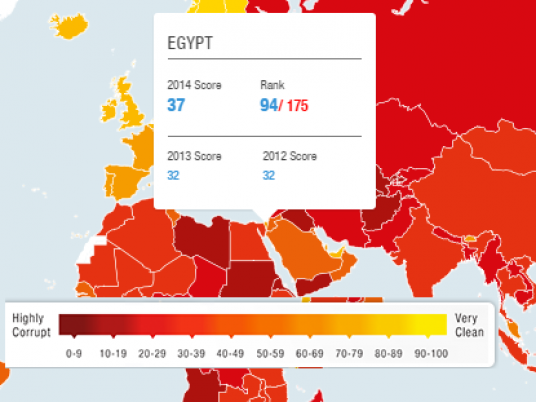
Egypt has witnessed big improvements in public sector's corruption in the year 2014, according to Corruption Perceptions Index. As it's score rises to 37 in 2014 from 32 in 2013, Egypt comes among the biggest improvers along with Côte d´Ivoire, Saint Vincent and the Grenadines (+5).
Egypt also moved from 114 (from 177 countries) to 94 (from 175 countries) on the ranking list of corruption index.
More than two thirds of the 175 countries in the 2014 Corruption Perceptions Index score below 50, on a scale from 0 (perceived to be highly corrupt) to 100 (perceived to be very clean). Denmark comes out on top in 2014 with a score of 92 while North Korea and Somalia share last place, scoring just eight.
The Corruption Perceptions Index is based on expert opinions of public sector corruption. Countries’ scores can be helped by open government where the public can hold leaders to account, while a poor score is a sign of prevalent bribery, lack of punishment for corruption and public institutions that don’t respond to citizens’ needs.
In the 20th edition of the Corruption Perceptions Index, scores for China (with a score of 36 out of 100), Turkey (45) and Angola (19) were among the biggest fallers with a drop of 4 or 5 points, despite average economic growth of more than 4 per cent over the last four years.
“The 2014 Corruption Perceptions Index shows that economic growth is undermined and efforts to stop corruption fade when leaders and high level officials abuse power to appropriate public funds for personal gain,” said José Ugaz, the chair of Transparency International.
“Corrupt officials smuggle ill-gotten assets into safe havens through offshore companies with absolute impunity,” Ugaz added. “Countries at the bottom need to adopt radical anti-corruption measures in favour of their people. Countries at the top of the index should make sure they don’t export corrupt practices to underdeveloped countries.”
“Grand corruption in big economies not only blocks basic human rights for the poorest but also creates governance problems and instability. Fast-growing economies whose governments refuse to be transparent and tolerate corruption, create a culture of impunity in which corruption thrives,” said Ugaz.
